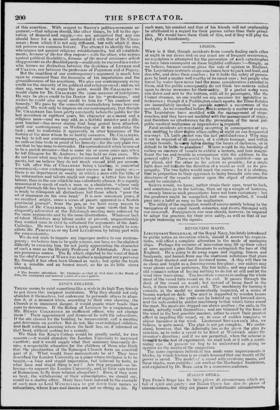REVOLVING MASTS.
LIEUTENANT SHULDHAM, of the Royal Navy, has lately introduced to public notice an invention which, should it answer his expecta- tions, will effect a complete alteration in the mode of managing ships. Perhaps the enemies of innovation may lift up their voices at once against a plan that threatens to extinguish the tars of Old England. He is going to do away ropes and rigging, braces and haulyards, and banish from use the unetuous substance that gives them their shortest and most favoured name. A ship will then be as clean and bright as a drawing-room fire-place ; our sailors may wear gloves and use perfumes, like fair ladies, and may realin the old woman's notion of having nothing to do but sit still and let the wind blow them along. The invention consists in making the whole mast of the vessel turn round on its end. It passes through the deck of the vessel as usual ; but instead of being fixed in the keel, it there turns on its own end. The machinery for turning it consists, in the model we momentarily inspected, of a series of booms worked on deck. The mast is supported by wooden beams instead of rigging ; the yards can be hoisted up and lowered clown, and the sails reefed by similar machinery to that which turns round the mast. No masts are stepped one above another ; the sails, in the model, actually work themselves ; and are trimmed by the force of the wind in the best possible manner, either to exert their greatest effect in impelling the vessel, or, in case of sudden tempests, to shiver harmless in the wind. Lieutenant SHULDHAM'S idea, we believe, is quite novel. The plan is not yet complete. We under- stand, however, that the Admiralty has so far given the plan its sanction, as to order a vessel to be fitted at Woolwich under the inventor's direction ; and if we are permitted, when the scheme is brought to-the test of experiment, we shall look at it with a scruti- nizing eye: At present we beg to be understood as giving no opinion on the merits of the suggestion.
The same ingenious individual has made some improvements in blocks, by which friction is so much lessened that one fourth of the power is saved. The model cf a vessel with revolving masts, and these blocks, were exhibited last week at the Mechanics' Institution, and explained by Dr. Biaaaacx to a numerous audience.


















 Previous page
Previous page